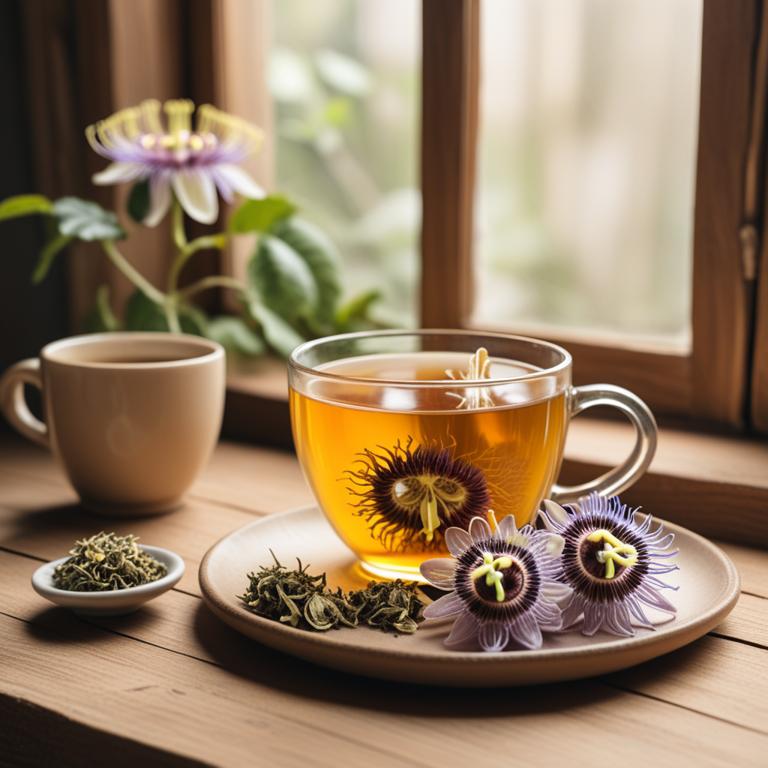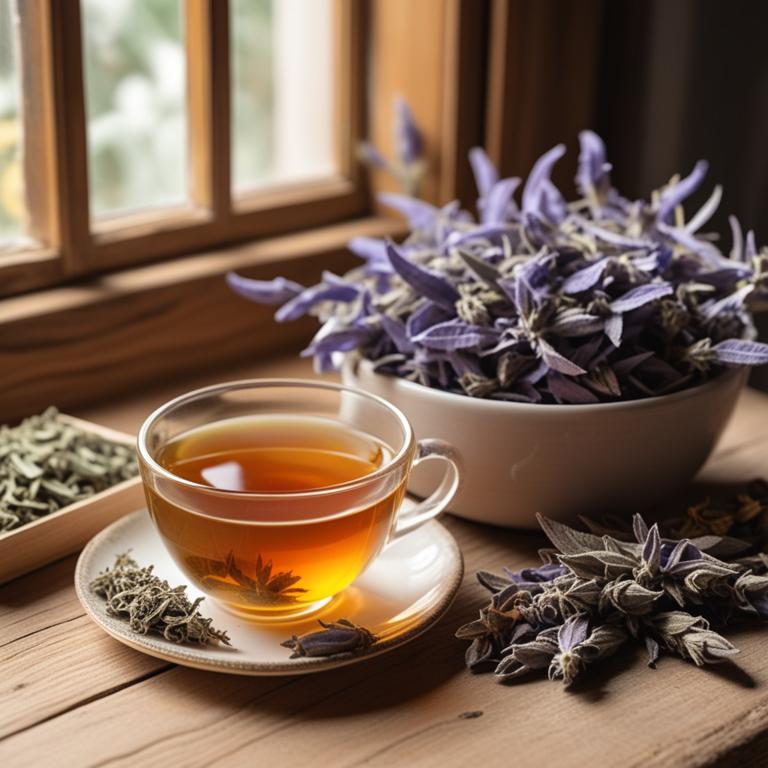7 Best Herbal Teas For Hypertension

Herbal teas for Hypertension are a type of natural remedy made from plant extracts that are designed to help lower blood pressure and alleviate symptoms of hypertension.
These teas have been traditionally used to provide relief from hypertension due to their antioxidant, anti-inflammatory, and vasodilatory properties.
Examples of herbal teas that are often used to treat hypertension include peppermint tea, which helps to relax blood vessels, chamomile tea, which reduces stress and anxiety, licorice root tea, which helps to lower blood pressure, passionflower tea, which acts as a natural sedative, and hawthorn tea, which helps to improve blood flow and reduce blood pressure.
By incorporating these herbal teas into their daily routine, individuals may experience a reduction in blood pressure, improved cardiovascular health, and a reduced risk of complications associated with hypertension.
According to "International journal of molecular sciences", teas for hypertension may have potential benefits due to the antihypertensive and cardioprotective effects of green tea, one of the phytotherapy products evaluated in the study.
Below there's a list of the 7 best herbal teas for hypertension.
- 1. Ginkgo biloba teas
- 2. Melissa officinalis teas
- 3. Glycyrrhiza glabra teas
- 4. Valeriana officinalis teas
- 5. Crataegus laevigata teas
- 6. Passiflora incarnata teas
- 7. Salvia officinalis teas
Also you may be interested in...
TODAY'S FREE BOUNDLE
Herb Drying Checklist + Herbal Tea Shopping List + Medicinal Herbs Flashcards
Enter you best email address below to receive this bundle (3 product valued $19.95) for FREE + exclusive access to The Aphotecary Letter.
$19.95 -> $0.00
1. Ginkgo biloba teas

Ginkgo biloba teas have been widely used as a natural remedy to help manage hypertension due to their vasodilatory properties, which help to relax and widen blood vessels, thereby reducing blood pressure.
The bioactive constituents of ginkgo biloba, such as flavonoids and terpenoids, particularly ginkgolides and bilobalide, have been shown to exert antioxidant, anti-inflammatory, and anti-apoptotic effects that contribute to their blood-pressure-lowering properties.
These constituents help to improve blood flow and reduce oxidative stress, which can contribute to the development of hypertension.
By reducing blood pressure and promoting overall cardiovascular health, ginkgo biloba teas offer a potential natural alternative for managing hypertension, providing benefits such as improved blood flow, reduced risk of cardiovascular disease, and enhanced overall well-being.
Related Study
According to "Clinical and experimental pharmacology & physiology", Ginkgo biloba teas for hypertension have been found to attenuate the development of hypertension and inhibit an increase in heart weight in DOCA-salt hypertensive rats.
2. Melissa officinalis teas

Melissa officinalis teas, also known as lemon balm, have been traditionally used to treat hypertension due to their calming and sedative properties.
The flavonoids, rosmarinic acid, and terpenes present in this herbal preparation help to reduce anxiety and stress levels, which can contribute to high blood pressure.
These bioactive constituents also exhibit vasodilatory and antioxidant effects, which help to lower blood pressure and prevent oxidative stress, thereby alleviating hypertension symptoms.
The regular consumption of Melissa officinalis teas can provide relief from hypertension by reducing anxiety, promoting relaxation, and improving overall cardiovascular health.
Related Study
According to "Phytotherapy research : PTR", Melissa officinalis teas may be beneficial for hypertension as they have been found to reduce systolic blood pressure, likely due to the antioxidant flavonols and flavonoids present in the plant.
3. Glycyrrhiza glabra teas

Glycyrrhiza glabra teas, a herbal preparation derived from the roots of the licorice plant, have been traditionally used to treat hypertension, a condition characterized by high blood pressure.
The antihypertensive properties of Glycyrrhiza glabra teas can be attributed to its ability to inhibit the enzyme 11-beta-hydroxysteroid dehydrogenase type 2 (11-beta-HSD2), which plays a key role in regulating blood pressure.
The bioactive constituents of Glycyrrhiza glabra teas, including glycyrrhizin, flavonoids, and phenolic acids, help to relax blood vessels and improve blood flow, thereby reducing blood pressure.
By incorporating Glycyrrhiza glabra teas into one's diet, individuals can experience a range of benefits, including improved cardiovascular health, reduced blood pressure, and enhanced overall well-being.
4. Valeriana officinalis teas

Valeriana officinalis teas have been traditionally used to treat hypertension due to their sedative and vasodilatory properties, which help to reduce blood pressure and alleviate symptoms associated with this condition.
The bioactive constituents of this herbal preparation, including valerenic acid, valeranone, and valepotriates, have been shown to exhibit a relaxing effect on the nervous system, leading to a decrease in heart rate and blood pressure.
By promoting relaxation and reducing stress, Valeriana officinalis teas can help to treat hypertension by mitigating the body's fight-or-flight response and allowing the body to return to a state of balance.
The benefits of using Valeriana officinalis teas to treat hypertension include improved cardiovascular health, reduced risk of cardiovascular disease, and a decrease in the reliance on pharmaceutical medications.
Related Study
According to "Frontiers in bioscience (Scholar edition)", Valeriana officinalis teas for hypertension showed vasorelaxant activity, with 14 out of 32 species examined exhibiting more than 50% inhibition in isolated rat aortic rings, suggesting potential antihypertensive properties.
5. Crataegus laevigata teas

Crataegus laevigata teas, derived from the hawthorn tree, have been traditionally used to treat hypertension due to their unique properties that help to alleviate symptoms associated with this condition.
The bioactive constituents present in this herbal preparation, such as flavonoids, triterpenoids, and oligomeric proanthocyanidins, have been shown to possess vasodilatory and antioxidant effects, which contribute to its therapeutic benefits.
These properties help to lower blood pressure by reducing peripheral resistance, improving blood vessel function, and enhancing the body's natural ability to regulate blood pressure.
Regular consumption of Crataegus laevigata teas has been found to provide numerous benefits, including improved cardiovascular health, reduced risk of cardiovascular disease, and a decrease in symptoms associated with hypertension.
Related Study
According to "Natural products and bioprospecting", Crataegus laevigata teas for hypertension are mentioned among the medicinal herbs used to normalize hypertension, indicating its potential anti-hypertensive effects.
6. Passiflora incarnata teas

Passiflora incarnata teas have been traditionally used to treat hypertension due to their unique combination of flavonoids, alkaloids, and glycosides.
These bioactive constituents help to promote relaxation, reduce anxiety, and lower blood pressure by acting on the body's natural stress response and improving cardiovascular function.
The herb's flavonoids, particularly kaempferol and quercetin, have been shown to possess antioxidant and vasodilatory properties, which contribute to its therapeutic effects in treating hypertension.
By consuming Passiflora incarnata teas, individuals can experience a range of benefits, including reduced blood pressure, improved sleep quality, and a decrease in the risk of cardiovascular disease.
7. Salvia officinalis teas

Salvia officinalis teas have been traditionally used to treat hypertension, a condition characterized by elevated blood pressure, due to their vasodilatory, anti-inflammatory, and antioxidant properties.
The bioactive constituents of Salvia officinalis, including rosmarinic acid and salvianolic acid, help to reduce blood pressure by promoting the relaxation of blood vessels and improving blood flow.
Regular consumption of Salvia officinalis teas has been found to help lower blood pressure in individuals with hypertension, thereby reducing the risk of cardiovascular disease and other related complications.
The benefits of using Salvia officinalis teas to treat hypertension include improved cardiovascular health, reduced risk of heart disease, and enhanced overall well-being.